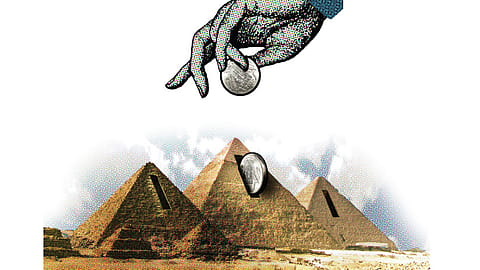A passage for India
The wave of popular uprising in West Asia and North Africa has opened up new horizons for the country. But business leaders will have to get proactive to make the most of them.

WHEN A TREE FALLS, the ground shakes. And in the aftermath, the dust often blurs vision. Political and business leaders in India have been watching the events that started off in Egypt and Tunisia and are waiting for the dust to settle. While they are cautious about the unfolding situation, there’s also excitement about the possibilities it presents. Besides rejuvenating economies in West Asia and North Africa, it promises to throw up economic opportunities for Indian businesses in the long run.
“We expect a change in Egypt’s economic policy once the new political order takes over in Cairo in the next few months. And India will play a major role in any government plan to rejuvenate the Egyptian economy,” says Arun K. Agarwal, director, Cosmos International, and chairman of Assocham’s international affairs committee. Delhi-based Cosmos International is a trading house and exports manufactured and agricultural products to Africa and West Asia.
Agarwal’s optimism stems from the fact that currently, economic relations of many countries in North Africa and West Asia are confined to the West, especially western Europe. But this has yielded little in terms of domestic manufacturing capacity and gainful employment for the local population. In the calendar year 2009, for instance, 55% of the region’s imports was sourced from western Europe, according to the United Nations Conference on Trade and Development. Europe’s share in the region’s manufactured imports is even higher at 58%.
“North Africa and West Asia have among the youngest populations in the world, but nearly a third of their workforce remains unemployed,” says A.K. Mohapatra, an expert on West Asia and Russia at Jawaharlal Nehru University’s School of International Studies in New Delhi.
The recent developments, therefore, may force a change in the economic policy of the countries in the region. The new government will try to address the root cause of the political crisis—persistent and structural unemployment, and lack of economic opportunities for the young.
To address this problem, these countries will have to create domestic productive capacity, which will need big doses of capital, skills and technology. And, according to Agarwal, India is best suited to provide capital and technology in automobiles, chemicals, pharmaceuticals, power generation equipment and agriculture machinery. “Indian companies score over their European and Chinese counterparts in cost, quality and superior after-sales service,” he says.
In 2009, India supplied less than 3% of the region’s imports and just 3.3% of the manufactured goods imports. The corresponding figures for China, currently the world’s largest exporter, were 6.7% and 1.5% respectively. There is immense scope for two of the world’s biggest economies to expand their presence in the region.
India is currently the twelfth largest foreign investor in Egypt, with cumulative foreign direct investment of over $2 billion. “The amount can grow manifold in the coming years if the political and economic environments become conducive,” Agarwal says.
Referring to policies such as freedom to import used cars, which discourages domestic manufacturing, Vishnu Mathur, director general of the Society of Indian Automobile Manufacturers, says: “If they persist with such a policy, it will work against local manufacturers though many would describe it as pro-consumer.” Mathur first noticed this policy anomaly when he visited Egypt a decade ago as part of an Automotive Component Manufacturers Association delegation. Besides, Egypt has a trade agreement with the European Union that allows tariff concessions on car imports from Europe.
Not surprisingly, most of Egypt’s domestic demand is met through imports from Europe, Japan and South Korea. In 2009, slightly over 60,000 passenger cars were manufactured in Egypt, according to the International Organisation of Motor Vehicle Manufacturers. The corresponding figures for Iran and Turkey were 1.3 million and 0.5 million cars respectively, although all three countries are of equal size in terms of population.
However, some business leaders in India remain cautious. “Even if governments change, I don’t foresee any major change in the region’s economic policies,” says Adi Godrej, chairman of the Godrej group. In the last few years, the group has made big inroads into Africa with a string of acquisitions in the consumer goods sector.
(INR CR)
Experts say policymakers in the region now face an economic compulsion to reduce their structural dependence on the West. “In the last few years, the region enjoyed an exports boom as many European manufacturers shifted their operations to the region, attracted by low wages in Egypt, Algeria, Tunisia, and Morocco,” says Mohapatra. “But this exports-led growth received a jolt in 2008 when Europe was hit by a recession.”
Egypt, India, and China were focal points of global trade for centuries. If Egypt gets it right, they could restore that glory.